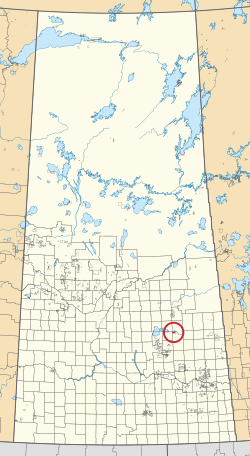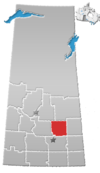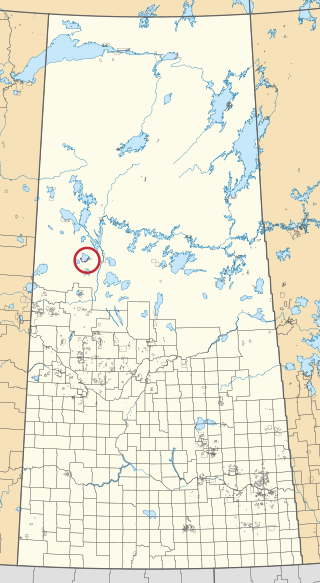
Canoe Lake 165 is an Indian reserve of the Canoe Lake Cree First Nation in the boreal forest of northern Saskatchewan, Canada. Its location is on Canoe Lake approximately thirty miles west of Beauval, within the ancient hunting grounds of the Woodland Cree. In the 2016 Canadian Census, it recorded a population of 912 living in 250 of its 273 total private dwellings. In the same year, its Community Well-Being index was calculated at 53 of 100, compared to 58.4 for the average First Nations community and 77.5 for the average non-Indigenous community. The reserve includes the settlement of Canoe Narrows. The name of the reserve and the settlement in Cree is nêhiyaw-wapâsihk ᓀᐦᐃᔭᐤ ᐘᐹᓯᕽ.

Waterhen 130 is an Indian reserve of the Waterhen Lake First Nation in Saskatchewan. It is 39 kilometers north of Meadow Lake. In the 2016 Canadian Census, it recorded a population of 672 living in 196 of its 213 total private dwellings. In the same year, its Community Well-Being index was calculated at 51 of 100, compared to 58.4 for the average First Nations community and 77.5 for the average non-Indigenous community.

Assiniboine 76 is an Indian reserve of the Carry the Kettle Nakoda First Nation in Saskatchewan. It is 80 kilometers east of Regina. In the 2016 Canadian Census, it recorded a population of 443 living in 182 of its 214 total private dwellings. In the same year, its Community Well-Being index was calculated at 54 of 100, compared to 58.4 for the average First Nations community and 77.5 for the average non-Indigenous community.

Shesheep 74A is an Indian reserve of the Zagime Anishinabek in Saskatchewan. It is on the left bank of the Qu'Appelle River, at the west end of Crooked Lake. In the 2016 Canadian Census, it recorded a population of 111 living in 56 of its 179 total private dwellings. In the same year, its Community Well-Being index was calculated at 81 of 100, compared to 58.4 for the average First Nations community and 77.5 for the average non-Indigenous community.

Star Blanket 83 is an Indian reserve of the Star Blanket Cree Nation in Saskatchewan. It is 18 kilometres northeast of Fort Qu'Appelle. In the 2016 Canadian Census, it recorded a population of 175 living in 48 of its 59 total private dwellings. In the same year, its Community Well-Being index was calculated at 50 of 100, compared to 58.4 for the average First Nations community and 77.5 for the average non-Indigenous community.

Fishing Lake 89A is an Indian reserve of the Fishing Lake First Nation in Saskatchewan, Canada. It is Section 13 and the southeast portion of Section 14, Township 33, Range 12, west of the Second Meridian. In the 2016 Canadian Census, it recorded a population of 0 living in 0 of its 0 total private dwellings.

Fond du Lac 227 is an Indian reserve of the Fond du Lac Denesuline First Nation in Saskatchewan. It is at the east end of Lake Athabasca. In the 2016 Canadian Census, it recorded a population of 903 living in 206 of its 231 total private dwellings. In the same year, its Community Well-Being index was calculated at 52 of 100, compared to 58.4 for the average First Nations community and 77.5 for the average non-Indigenous community.

Keeseekoose 66 is an Indian reserve of the Keeseekoose First Nation in Saskatchewan. It is 16 kilometres north of Kamsack. In the 2016 Canadian Census, it recorded a population of 491 living in 135 of its 155 total private dwellings. In the same year, its Community Well-Being index was calculated at 50 of 100, compared to 58.4 for the average First Nations community and 77.5 for the average non-Indigenous community.
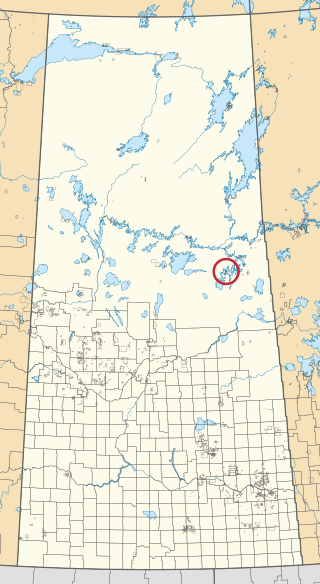
Kimosom Pwatinahk 203 is an Indian reserve of the Peter Ballantyne Cree Nation in Saskatchewan. It is on the south shore of the northerly part of Deschambault Lake. In the 2016 Canadian Census, it recorded a population of 1061 living in 199 of its 221 total private dwellings. In the same year, its Community Well-Being index was calculated at 40 of 100, compared to 58.4 for the average First Nations community and 77.5 for the average non-Indigenous community.

Lac la Hache 220 is an Indian reserve of the Hatchet Lake Dene Nation in Saskatchewan. It is 354 kilometres north of Flin Flon. In the 2016 Canadian Census, it recorded a population of 1377 living in 260 of its 282 total private dwellings. In the same year, its Community Well-Being index was calculated at 37 of 100, compared to 58.4 for the average First Nations community and 77.5 for the average non-Indigenous community.
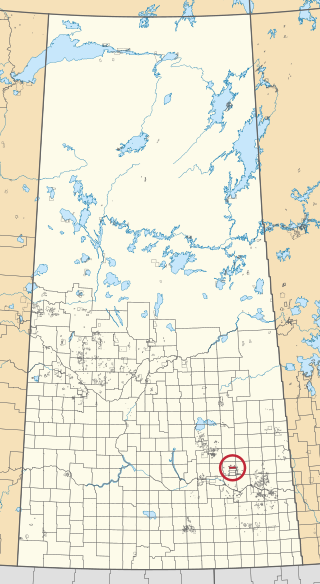
Little Black Bear 84 is an Indian reserve of the Little Black Bear First Nation in Saskatchewan. It is 19 kilometres east of Fort Qu'Appelle. In the 2016 Canadian Census, it recorded a population of 137 living in 34 of its 43 total private dwellings. In the same year, its Community Well-Being index was calculated at 51 of 100, compared to 58.4 for the average First Nations community and 77.5 for the average non-Indigenous community.

Muscowpetung 80 is an Indian reserve of the Muscowpetung First Nation in Saskatchewan. It is 31 kilometres west of Fort Qu'Appelle along the south-west shore of Pasqua Lake, which is one of four Fishing Lakes. In the 2016 Canadian Census, it recorded a population of 275 living in 87 of its 112 total private dwellings. In the same year, its Community Well-Being index was calculated at 54 of 100, compared to 58.4 for the average First Nations community and 77.5 for the average non-Indigenous community.

Ocean Man 69 is an Indian reserve of the Ocean Man First Nation in Saskatchewan. It is 20 kilometres northeast of Stoughton. In the 2016 Canadian Census, it recorded a population of 185 living in 56 of its 61 total private dwellings. In the same year, its Community Well-Being index was calculated at 48 of 100, compared to 58.4 for the average First Nations community and 77.5 for the average non-Indigenous community.

Okanese 82 is an Indian reserve of the Okanese First Nation in Saskatchewan. It is 16 kilometres northeast of Fort Qu'Appelle. In the 2016 Canadian Census, it recorded a population of 175 living in 56 of its 69 total private dwellings. In the same year, its Community Well-Being index was calculated at 57 of 100, compared to 58.4 for the average First Nations community and 77.5 for the average non-Indigenous community.

Peepeekisis 81 is an Indian reserve of the Peepeekisis Cree Nation in Saskatchewan. It is 14 kilometres east of Fort Qu'Appelle. In the 2016 Canadian Census, it recorded a population of 491 living in 135 of its 146 total private dwellings. In the same year, its Community Well-Being index was calculated at 53 of 100, compared to 58.4 for the average First Nations community and 77.5 for the average non-Indigenous community.

Poorman 88 is an Indian reserve of the Kawacatoose First Nation in Saskatchewan. It is 87 kilometres northwest of Fort Qu'Appelle. In the 2016 Canadian Census, it recorded a population of 729 living in 172 of its 196 total private dwellings. In the same year, its Community Well-Being index was calculated at 47 of 100, compared to 58.4 for the average First Nations community and 77.5 for the average non-Indigenous community.

Southend 200 is an Indian reserve of the Peter Ballantyne Cree Nation in Saskatchewan. It is 402 kilometres northeast of Prince Albert. In the 2016 Canadian Census, it recorded a population of 917 living in 177 of its 206 total private dwellings. In the same year, its Community Well-Being index was calculated at 43 of 100, compared to 58.4 for the average First Nations community and 77.5 for the average non-Indigenous community.

Southend 200A is an Indian reserve of the Peter Ballantyne Cree Nation in Saskatchewan. It is adjacent to the west side of Southend 200. In the 2016 Canadian Census, it recorded a population of 128 living in 30 of its 37 total private dwellings. In the same year, its Community Well-Being index was calculated at 49 of 100, compared to 58.4 for the average First Nations community and 77.5 for the average non-Indigenous community.

Standing Buffalo 78 is an Indian reserve of the Standing Buffalo Dakota Nation in Saskatchewan. It is 8 kilometres north-west of Fort Qu'Appelle. In the 2016 Canadian Census, it recorded a population of 569 living in 184 of its 198 total private dwellings. In the same year, its Community Well-Being index was calculated at 59 of 100, compared to 58.4 for the average First Nations community and 77.5 for the average non-Indigenous community.

Yellow Quill 90 is an Indian reserve of the Yellow Quill First Nation in Saskatchewan. It is 19 kilometers northwest of Kelvington. In the 2016 Canadian Census, it recorded a population of 436 living in 110 of its 121 total private dwellings. In the same year, its Community Well-Being index was calculated at 45 of 100, compared to 58.4 for the average First Nations community and 77.5 for the average non-Indigenous community.
